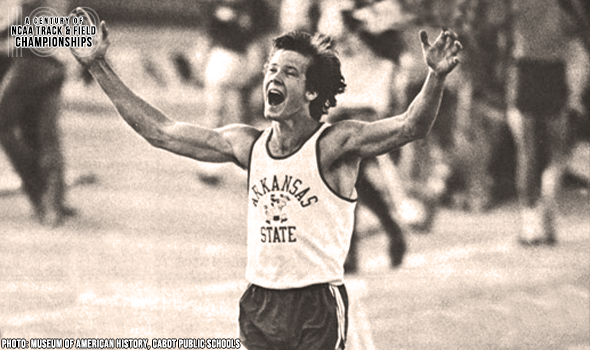
Howl Yes! Bell Vaulted To Greatness
Earl Bell of Arkansas State was in second place when the pole vault bar was raised to a meet-record height of 18-1 (5.51m) at the 1975 NCAA Outdoor Championships.
If successful, Bell would become the first 18-footer in meet history and, at the age of 19, the world’s first teenager over the barrier.
The only problem was he had lots of company – four had cleared the previous meet record height of 17-8 (5.38m), and the other three all had higher PRs than Bell. Leading that group was the first collegiate 18-footer, Dan Ripley of San Jose State, who scaled 18-1 a few months earlier for a world indoor best.
“When you get in a meet like this, it’s not only how much ability you have, but how much class and the ability to respond,” Arkansas State coach Guy Kochel explained to the Associated Press. “If a guy is not a consistent vaulter; if he does not have a little character, he’s going to choke before it’s over.”
“Choke” wasn’t in Bell’s vocabulary that day.
He was indeed the meet’s first 18-foot vaulter with a second-attempt clearance. Only Ripley could match him on his third – and when neither got over 18-4 (5.59m), Bell became the Red Wolves’ first NCAA outdoor champion.
“He can go higher than 18-1, but I can’t say how high,” added Kochel. “He’s not far from the world record (which was 18-6½ or 5.65m). Most people really don’t know how close he is. He was over 18-4 twice in the NCAA and brushed it coming down.”
Well, after repeating as NCAA Indoor champ with the meet’s first 18-foot clearance, Bell opened the outdoor season with a collegiate record of 18-3½ (5.57m). Bell asked the bar to be raised to the world record of 18-7 (5.66m) and while he missed on each of those attempts, he eventually got the mark two months later when he soared over 18-7¼ (5.67m). That made Bell, now 20, the youngest vault world record holder since 19-year-old Brian Sternberg of Washington became history’s first 5-meter (16-4¾) vaulted in 1963.
What made Bell’s world record even more remarkable was that he needed that all-time clearance just to win. He was behind on misses to Kansas alum Terry Porter, who PR’d by six inches at 18-1.
“Porter’s jump made a hell of a difference,” Bell told Don Steffens for Track & Field News. “I was jumping well obviously, but Porter … wow! Last year at the NCAA, I had the same feeling when Ripley was leading.”
Bell eventually repeated as NCAA Outdoor champ – raising the meet record to 18-1¼ (5.51m) – and then made the U.S. Olympic team for Montreal, where he finished sixth. In 1977 he added a third-straight NCAA Outdoor title to join Dave Roberts of Rice as then the only three-time solo winners of the event.
Seven years later, Bell became the first American to clear 19 feet (5.80m) outdoors and earned an Olympic bronze medal. It was a moment for celebration for the Bell family, which had a long history of vaulting success. Bell was the youngest of four vaulting brothers and began jumping at the age of 5. His dad William – a future masters word record holder from age 75 to 95 – made his poles in the early days.
After retiring in 1991, Earl Bell opened the doors of Bell Athletics in his Arkansas hometown of Jonesboro and has guided multiple future Olympians. Bell’s ASU school record of 18-7¼ lasted 43 years until the 2019 NCAA Outdoor Championships, when fellow Jonesboro native – and Bell Athletics pupil – Michael Carr raised his PR some eight inches to 5.70m (18-8¼) to finish fifth.
The NCAA and collegiate track & field will mark a momentous milestone in the spring of 2021 -- the 100th anniversary of the NCAA Championships and with that, the NCAA Track & Field Championships. In June 1921, the University of Chicago hosted the first track & field championships in NCAA history.
This point can’t be emphasized enough: Not only was the event the first for NCAA track & field, but the first championships for any sport under the sponsorship of the NCAA.
To celebrate, over each of the next 365 days, the U.S. Track & Field and Cross Country Coaches Association (USTFCCCA) will celebrate moments, student-athletes, and coaches that have made a century’s worth of championships special. From humble beginnings to important historical milestones to the modern-day, collegiate track & field has evolved with the American society.
The 2021 edition of the NCAA Division I Outdoor Track & Field Championships begin with preliminary round action on May 27-29 in Jacksonville, Fla., and College Station, Texas. The championships final site and culmination of the celebration is slated for June 9-12, 2021 at the newly rebuilt Hayward Field in Eugene, Ore.

Lawson Completed “Jesse Owens Triple” In 2016
Jarrion Lawson won the 100, 200 and long jump at the 2016 NCAA Division I Outdoor Track & Field Championships.

Plab Reached Lofty Heights In NCAA HJ
Darrin Plab won back-to-back HJ titles at the NCAA DI Outdoor T&F Championships in 1991 & 1992. Plab cleared 2.34m (7-8) in 1992 & tied the 2nd best bar in meet history.
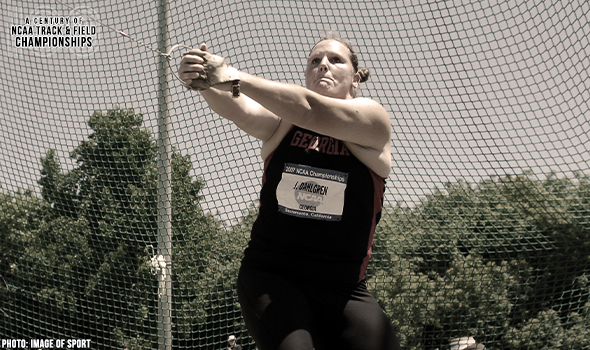
Dahlgren Won Back-To-Back HT Titles, Set MR
Jenny Dahlgren won back-to-back hammer titles at the NCAA DI Outdoor T&F Championships in 2006 & 2007. Dahlgren set a MR of 70.72m (232-0) in that second year.

Peoples Made History One Lap At A Time
Maurice Peoples won the 440-yard dash in 1973 & then really turned up the heat. Peoples split 43.4 on the Sun Devils’ mile relay team that finished third in the final.
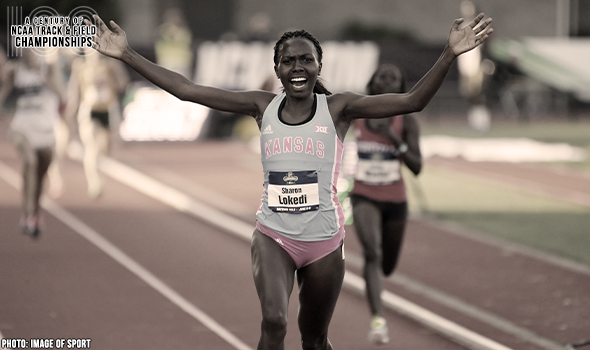
KU’s Lokedi Set 10K MR In 2018
Sharon Lokedi won the 10K at the 2018 NCAA DI Outdoor T&F Championships in a meet-record 32:09.20. Lokedi led five other women under the old final-site best, too.
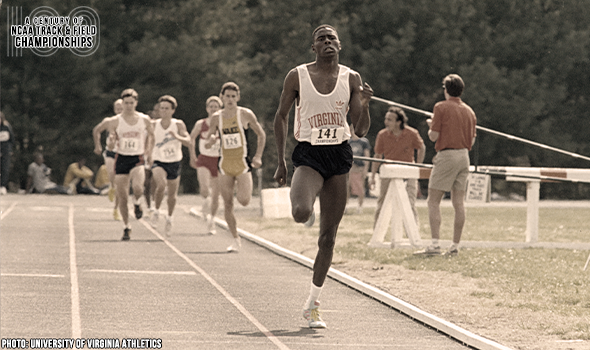
Can Ereng Kick It? Yes, He Can!
Paul Ereng won back-to-back 800-meter titles at the NCAA DI Outdoor T&F Championships in 1988 & 1989. Ereng is still the current indoor record holder in the event.
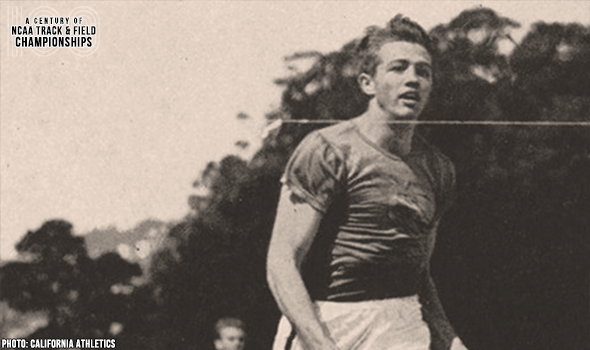
“California Comet” Doubled Up At NCAAs
Hal Davis completed the 100-200 double twice at the NCAA Outdoor Track & Field Championships.
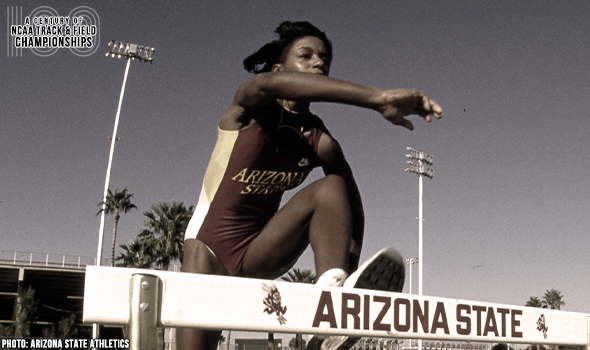
Tolbert Clocked 100H Meet Record In 1988
Lynda Tolbert won two career 100H titles at the NCAA DI Outdoor T&F Championships in 1988 & 1990. When Tolbert won in 1988, she set a MR of 12.82.
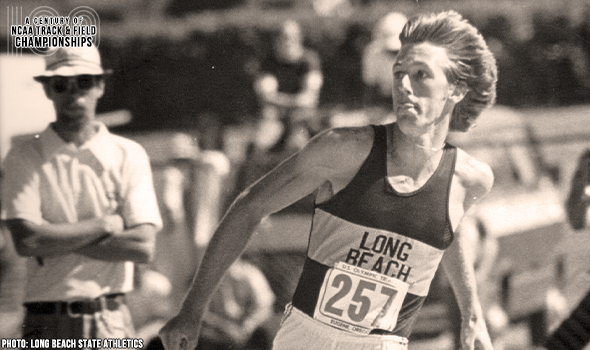
Dwight Stones Set High Jump WR In 1976
Dwight Stones set a world record in the high jump of 2.31m (7-7) at the 1976 NCAA DI Outdoor T&F Championships. Stones also raised the MR by more than 3 inches!
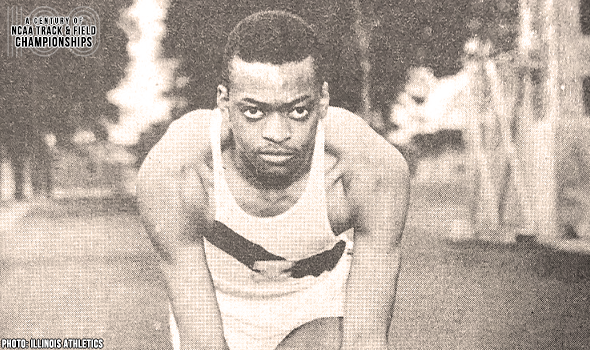
Walker Completed Only Hurdling Triple
George Walker is the only athlete in NCAA Outdoor T&F Championships history to win all three hurdling events: 110H (120H), 400H & now-defunct 220H.

